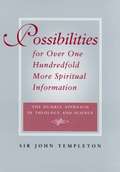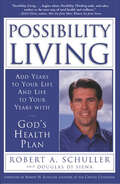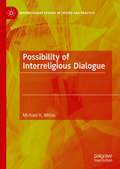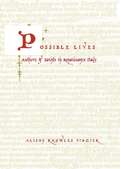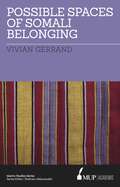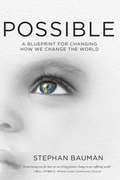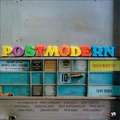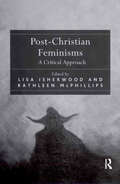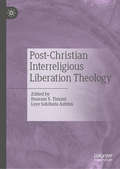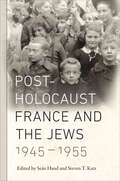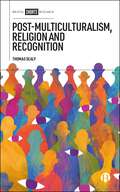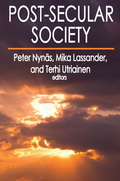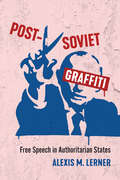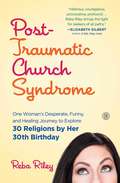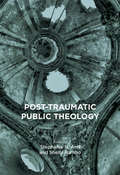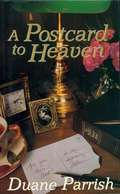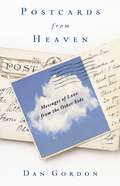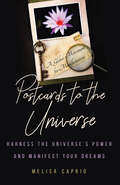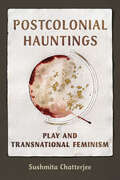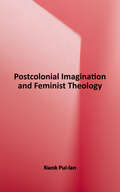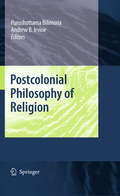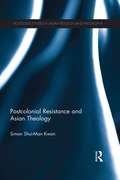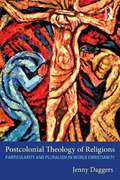- Table View
- List View
Possibilities for Over One Hundredfold More Spiritual Information: The Humble Approach in Theology and Science
by Sir John TempletonThus Sir John Templeton challenges the reader to apply the same energy that has been devoted to scientific inquiry to the pursuit of spiritual information. The world is at a state of unprecedented technical expertise, but why has our knowledge and faith in our own spirituality stalled and become obsolete in recent times? Possibilities for Over One Hundredfold More Spiritual Information seeks to address this question. It points out that our spiritual knowledge would also have the capacity to increase dramatically if we were to open our minds to the endless possibilities that await us in terms of our spiritual lives. These include altruistic love for all people, new knowledge of the Divine, and a greater sense of our place in the universe. In order for us as human beings to take advantage of all of the spiritual gifts that we have been given, we need to be open and receptive to our individual spiritual natures, and to open ourselves to the limitless spiritual possibilities available to us. The book acknowledges the ancient scriptures and thinkers who have guided us for centuries. Vastly expanded research and the use of scientific method would only enhance our understanding of the wisdom contained within these wise teachings. The benefits of extending our spiritual knowledge might, in fact, exceed the benefits we have realized thus far from scientific and medical advances. Possibilities for Over One Hundredfold More Spiritual Information seeks to reawaken our desire for spiritual knowledge pushed aside so long ago in our quest for scientific knowledge. When these fields work together, the world will reap greater rewards that we can ever imagine.
Possibility Living: God's Health Plan
by Robert A. Schuller Douglas Di SennaIn this guide for spirit, mind, and body, internationally known minister Robert A. Schuller and natural health specialist Douglas Di Siena weave scripture, spirituality, natural health advice, and inspiring true-life stories together in a practical, innovative approach to living wholly, healthfully, and happily. By taking positive steps, such as eating a natural diet, fasting, and praying, you can tap into your innate power for possibility living, remaining open to the voice of God in your life as you nurture your whole being.
Possibility of Interreligious Dialogue (Interreligious Studies in Theory and Practice)
by Michael H. MitiasIs dialogue between the major religions of the world possible? If it is possible, under what conditions? In this book, Michael H. Mitias argues that it is possible provided various conditions are met. These conditions include mutual respect, mutual understanding, and God-centeredness. First, how can a religion that is unusually complex—composed of a doctrine founded in a unique divine revelation, a leadership class of theologians, teachers, clergy, and administrators, and a community across global cultures—show uniform respect to another religion? How can a complex institution like a religion truly understand another religion? Third, can the different religions worship the same God if their conceptions of God are based on their unique doctrines? Mitias addresses these questions and argues that it is possible for religions to respect and understand one another. Further, he argues that the different conceptions of God are necessarily founded in a belief in the existence of a transcendent, infinite, and wise being.
Possible Lives: Authors and Saints in Renaissance Italy
by Alison Knowles FrazierPossible Lives uses the saints'lives written by humanists of the Italian Renaissance to explore the intertwining of classical and religious cultures on the eve of the European Reformation. The lives of saints were among the most reproduced and widely distributed literatures of medieval and early modern Europe. During the century before the Reformation, these narratives of impossible goodness fell into the hands of classicizing intellectuals known as humanists. This study examines how the humanist authors received, criticized, and rewrote the traditional stories of exemplary virtue for patrons and audiences who were surprisingly open to their textual experiments. Drawn from a newly constructed catalog of primary sources in manuscript and print, the cases in this book range from the lure of martyrdom as the West confronted Islam to the use of saints'lives in local politics and the rhetorician's classroom. Frazier discusses the writers'perceptions of historical sanctity, the commanding place of the mendicant friars, and one unique account of a contemporary holy woman.Possible Lives shows that the classical Renaissance was also a saintly Renaissance, as humanists deployed their rhetorical and philological skills to "renew the persuasive force of Christian virtue" and "save the cult of the saints." Combining quantitative and anecdotal approaches in a highly readable series of case studies, Frazier reveals the contextual richness of this little-known and unexpectedly large body of Latin hagiography.
Possible Spaces of Somali Belonging (Islamic Studies Series)
by Vivian GerrandWhat happens when Somalis migrate to countries with which they have few cultural ties? What helps Somalis to feel at home in their new Western countries of residence? Possible Spaces of Somali Belonging explores representations of Somali resettlement to understand the mechanics of contemporary belonging and the challenges faced by Western societies as they attempt to 'integrate' Somali migrants. How do particular representations contribute to or detract from Somali belonging? In the contexts of Australia and Italy-taken as case studies-Somalis are marginalised in different ways. With a multi-disciplinary approach, this book examines different forms of Somali representation in Australia and Italy that engender a sense of belonging and expands exclusive definitions of nationhood. Islamic Studies Series - Volume 21
Possible: A Blueprint for Changing How We Change the World
by Stephan BaumanWe need a better vision for saving the world. Across the world, people like you are rising up to fight poverty, oppression, and injustice--not just professionals, but bloggers, musicians, entrepreneurs, artists, homemakers, and advocates. People who refuse to accept the world as it is, who dare to believe change is possible. But we face a crisis of vision. We sense what needs to be done, but often we don't know how to do it. Without a better blueprint for doing good well, our moment in history will slip away. Stephan Bauman, president of a leading charity believes true change begins in the hearts and actions of ordinary people. In Possible, he presents clear and biblical thinking, powerful stories, and practical tools for sustainably impacting our workplaces, neighborhoods, villages, and cities. Possible is an eloquent and personal call to reconsider what it means to change ourselves so that we can change the world.From the Hardcover edition.
Post Modern Youth Ministry: Exploring Cultural Shift, Creating Holistic Connections, Cultivating Authentic Community
by Tony JonesThe rules have changed. Everything you believe is suspect. The world is up for grabs. Welcome to the emerging postmodern culture. A "free zone" of rapid change that places high value on community, authenticity, and even God--but has little interest in modern, Western-tinged Christianity. Postmodern Youth Ministry addresses these enormous philosophical shifts and shows how they're affecting teenagers.
Post-Christian Feminisms: A Critical Approach
by Lisa IsherwoodThis book explores the impact and contribution of post-theories in the field of Christian feminist theology. Post-theory is an important and cutting-edge discursive field which has revolutionized the production of knowledge in both feminism and theology. This book fills a gap by providing a text that can make authoritative statements on the use and status of post-theory in feminist theology, and secondly it makes an on-going contribution to the discourse of Christian feminist theology and its liberation agenda. Distinguished and established scholars contribute conclusive essays on the most recent and exciting developments in post-theory, feminism and theology.
Post-Christian Interreligious Liberation Theology
by Hussam S. Timani Loye Sekihata AshtonThis book explores the ideals of liberation theology from the perspectives of major religious traditions, including Islam, Christianity, Judaism, Buddhism, and the neo-Vedanta and Advaita Hindu traditions. The goal of this volume is not to explain the Christian liberation theology tradition and then assess whether the non-Christian liberation theologies meet the Christian standards. Rather, authors use comparative/interreligious methodologies to offer new insights on liberation theology and begin a dialogue on how to build interreligious liberation theologies. The goal is to make liberation theology more inclusive of religious diversity beyond traditional Christian categories.
Post-Holocaust France and the Jews, 1945-1955 (Elie Wiesel Center for Judaic Studies Series #2)
by Seán Hand Steven T KatzDespite an outpouring of scholarship on the Holocaust, little work has focused on what happened to Europe’s Jewish communities after the war ended. And unlike many other European nations in which the majority of the Jewish population perished, France had a significant post‑war Jewish community that numbered in the hundreds of thousands. Post-Holocaust France and the Jews, 1945–1955 offers new insight on key aspects of French Jewish life in the decades following the end of World War II.How Jews had been treated during the war continued to influence both Jewish and non-Jewish society in the post-war years. The volume examines the ways in which moral and political issues of responsibility combined with the urgent problems and practicalities of restoration, and it illustrates how national imperatives, international dynamics, and a changed self-perception all profoundly helped to shape the fortunes of postwar French Judaism.Comprehensive and informed, this volume offers a rich variety of perspectives on Jewish studies, modern and contemporary history, literary and cultural analysis, philosophy, sociology, and theology.With contributions from leading scholars, including Edward Kaplan, Susan Rubin Suleiman, and Jay Winter, the book establishes multiple connections between such different areas of concern as the running of orphanages, the establishment of new social and political organisations, the restoration of teaching and religious facilities, and the development of intellectual responses to the Holocaust. Comprehensive and informed, this volume will be invaluable to readers working in Jewish studies, modern and contemporary history, literary and cultural analysis, philosophy, sociology, and theology.
Post-Multiculturalism, Religion and Recognition
by Thomas SealyThis book examines the evolving relationship between multiculturalism, religion and diversity in Western Europe, proposing a shift towards a post-multicultural approach to address religious and secular pluralism. The author responds to criticisms of multiculturalism's approach to public religion, including perceived group reification and limited focus on intra-group domination, gender and sexuality equalities. Through a critical dialogue between multicultural theory and political theology, the book offers an original framework for post-multicultural recognition. Enriching multiculturalism by integrating religious reason and institutional pluralism, this book contributes crucial new insights to debates on religion, equality and diversity in public life.
Post-Secular Society
by Gustaaf GeeraertsPost-Secular Society argues for several characteristics of the secular: the experience of living in a secular age and the experience of living without religion as a normal condition.Religion in the West is often seen as marked by both innovation and disarray. In spite of differing approaches and perspectives of secularization, rational choice and de-secularization, many scholars agree that the West is experiencing a general "resurgence" of religion across most Western societies.Post-Secular Society discusses the changes in religion related to globalization and New Age forms of popular religion. The contributors review religion that is rooted in the globalized political economy and the relationship of post-secularism to popular consumer culture. Also reviewed is innovative discourse as a religious belief system, theories of the post-secular, religious, and spiritual well-being, and healing practices in Finland and environmentalism. This paperback edition includes a new preface by Peter Nynas.
Post-Soviet Graffiti: Free Speech in Authoritarian States
by Alexis LernerFor more than a decade, Alexis Lerner combed the alleyways, underpasses, and public squares of cities once under communist rule, from Berlin in the west to Vladivostok in the east, recording thousands of cases of critical and satirical political street art and cataloging these artworks linguistically and thematically across space and time. Complemented by first-hand interviews with leading artists, activists, and politicians from across the region, Post-Soviet Graffiti provides theoretical reflection on public space as a site for political action, a semiotic reading of signs and symbols, and street art as a form of text. The book answers the question of how we conceptualize avenues of dissent under authoritarian rule by showing how contemporary graffiti functions not only as a popular public aesthetic, but also as a mouthpiece of political sentiment, especially within the post-Soviet region and post-communist Europe. A purposefully anonymous and accessible artform, graffiti is an effective tool for circumventing censorship and expressing political views. This is especially true for marginalized populations and for those living in otherwise closed and censored states. Post-Soviet Graffiti reveals that graffiti does not exist in a vacuum; rather, it can be read as a narrative about a place, the people who live there, and the things that matter to them.
Post-Traumatic Church Syndrome: One Woman's Desperate, Funny, and Healing Journey to Explore 30 Religions by Her 30th Birthday
by Reba RileyWritten with humor and personality, this debut memoir recounts a woman’s spiritual quest of experiencing thirty religions before her thirtieth birthday. Post-Traumatic Church Syndrome is for questioners, doubters, misfits, and seekers of all faiths, and tackles the universal struggle to heal what life has broken.On her twenty-ninth birthday, while guests were arriving downstairs, Reba Riley was supposedly upstairs getting dressed. In actuality, she was slumped on the floor sobbing about everything from the meaning of life to the pile of dirty laundry on the floor. Life without God was crashing in on her. And she was sick and tired of feeling sick and tired. She uttered a desperate prayer, and then the idea came to her—thirty by thirty. And thus she embarked on a year-long quest to experience thirty religions by her thirtieth birthday. During her spiritual sojourn, Riley: -Was interrogated about her sex life by Amish grandmothers -Disco danced in a Buddhist temple -Fasted for thirty days without food—or wine -Washed her lady parts in a mosque bathroom -Was audited by Scientologists -Learned to meditate with an urban monk -Snuck into a Yom Kippur service with a fake grandpa in tow -And finally discovered she didn’t have to choose a religion to choose God In a debut memoir that is funny and earnest, Riley invites questioners, doubters, misfits, and curious believers to participate in the universal search to heal what life has broken. Post-Traumatic Church Syndrome takes you by the hand and reminds you that sometimes you first have to be lost in order to be found.
Post-Traumatic Public Theology
by Stephanie N. Arel Shelly RamboThis book imagines new modes of religious response to trauma, moving beyond simple answers to the 'why' of human suffering toward discussions of profound expressions of faith in the aftermath of trauma. Engaging current realities such as war, race, and climate change, chapters feature specific locations from which theology is done and draw on the resources of Christian faith in order to respond. This volume recognizes religious leaders as first-responders to trauma and offers theological reflections that can stand up in the current realities of violence and its aftermath. The writings provide models for how to integrate the language of faith with the literature of trauma.
Postcard to Heaven
by Duane Parrish"For my thoughts are not your thoughts, neither are your ways my ways, declares the Lord." How can we know where the testing times in our lives come from? Do they come from a loving God? Or do they come from the age-old deceiver? How can we tell the difference, and is there always eventual relief from pain? When the Gethsemane experiences come to us - when circumstances bring sweatdrops of blood - how do we find our way back to the mountaintop?
Postcards for People Who Hurt
by Claire CloningerHealing messages from God's Word are quoted and coupled with a personalized letter, paraphrased from Scripture, from God to you. These love-letters are written especially for the bruised and brokenhearted.
Postcards from Heaven: Messages of Love from the Other Side
by Dan Gordon"Nearly all of us either have had or have heard of an experience in which a soul already departed reaches back to us who have been left behind.... Sometimes, it's no more than a whisper, a familiar smell in the air, or just the feeling of presence as vivid as when the loved one was still alive. These moments are just that...moments, a glimpse behind the veil; not a letter from heaven, but a postcard." (Dan Gordon, Postcards from Heaven) A postcard from heaven is not a revelation from on high -- rather, it's "a whisper, a familiar smell in the air, or just the feeling of presence" of someone who's passed away. It is just enough of a message to imply that what we call life is not ended by what we call death. Dan Gordon has been receiving these postcards all his life -- from his father, his older brother, and his son Zaki, who was killed in a car accident when he was only twenty-two. Postcards from Heaven is the beautiful, inspirational memoir of four generations of a remarkable family and how they remain interconnected, a part of one another's stories, even after passing to the other side. Here is the span of his father's long life, moving and funny, from the Russian Revolution to his improbable Depression-era courtship of a woman named Goddess -- Gordon's mother -- to his spiritual later years in Israel; his incorrigible older brother's mischievous magic, able to find humor even in cancer treatment; and his brilliant son, a natural storyteller who looked destined to follow his father into the movie business. These are the stories of their lives on earth as well as after death. Full of humor, compassion, and love, Postcards from Heaven comforts and assures us that those we loved can reach back to those of us still on earth -- and, if only we are attentive enough to listen, we can hear them say, Got here safe. It's really beautiful. Much love, till we meet again.
Postcards to the Universe: Harness the Universe's Power and Manifest Your Dreams
by Melisa Caprio&“Masterfully weaves thought-provoking text, inspiring stories, and soul-empowering activities all into one fantastic life changing book.&” —G. Brian Benson, bestselling author of Habits for Success: Inspired Ideas to Help You Soar We have the ability to be in open communication with the Universe, the loving energy behind all creation. But do we listen to what the Universe has to say? Do we use our own voices to speak back? Artist-photographer, radio host, and blogger Melisa Caprio helps us enter into deep conversation with the Universe by combining creative visualization with the power of intention. Too often we are so caught up in daily life that we don&’t stop and ask ourselves what we truly desire. While it is tempting to stay in our comfort zone, our heart longs for more than the mundane. It desires manifestation. Caprio is here to foster that state of mindfulness and spirituality through photography, postcard art, written messages, and affirmations from others who are living their greatest desires. Harness your own spiritual power with this unique visual guide to attain the creativity and fulfillment you long for in your life—as you learn to bend the ear of the Universe and: Put mind over matter and pursue your deepest desiresForm an active and poignant relationship with the UniverseReach your full potential and feel empowered to live an inspired and successful life
Postcolonial Hauntings: Play and Transnational Feminism (Dissident Feminisms)
by Sushmita ChatterjeeOften examined separately, play and hauntings in fact act together to frame postcolonial issues. Sushmita Chatterjee showcases their braided workings in social and political fabrics. Drawing on this intertwined idea of play and hauntings, Chatterjee goes to the heart of conundrums within transnational postcolonial feminisms by examining the impossible echoes of translations, differing renditions of queer, and the possibilities of solidarity beyond the fraternal friendships that cement nation-states. Meaning-plays, or slippages through language systems as we move from one language to another, play a pivotal role in a global world. As Chatterjee shows, an attentiveness to meaning-plays discerns the past and present, here and there, and moves us toward responsive ethics in our theories and activisms. Insightful and stimulating, Postcolonial Hauntings centers the inextricable work of play and hauntings as a braided ethics for postcolonial transnational struggles.
Postcolonial Images of Spiritual Care: Challenges of Care in a Neoliberal Age
by Emmanuel Y. Lartey Hellena Moon Bonnie Miller-McLemore Abdullahi Ahmed An-Na'ImThis anthology is about caring for all persons as a part of the revolutionary struggle against colonialism in its many forms. In recognition of the varied ways in which different forms of oppression, injustice, and violence in the world today are traceable to the legacy and continuing effects of colonialism, various authors have contributed to the volume from diverse backgrounds including differing ethnic identities, religious and cultural traditions, gender and sexual orientations, as well as communal and personal realities. <P><P> As a postcolonial critique of spiritual care, it highlights the plurality of voices and concerns that have been overlooked or obscured because of the politics of race, religion, sexuality, nationalism, and other structures of power that have shaped what discursive spiritual care entails today. Postcolonial Images of Spiritual Care presents voices of practical and pastoral theologians, academics, spiritual care providers, religious leaders, students, and activists working to provide greater intercultural spiritual care and awareness in the areas of healthcare, community work, and education. The volume, as such, expands the discourse of spiritual care and participates in the ongoing paradigm shifts in the field of pastoral and practical theology.
Postcolonial Imagination and Feminist Theology
by Kwok Pui-LanThe burgeoning field of postcolonial studies argues that most theology has been formed in dominant cultures, laden intrinsically with imperializing structures. An essential task facing theology is thus to "decolonize" the mind and free Christianity from colonizing bias and structures. Here, in this truly groundbreaking study, highly respected feminist theologian Kwok Pui-lan offers the first full-length theological treatment of what it means to do postcolonial feminist theology. She explains her methodological basis and explores several specific topics, including Christology, pluralism, and creation.
Postcolonial Philosophy of Religion
by Andrew B. Irvine Purushottama BilimoriaThe essays in this volume take up the history of philosophy of religion and contemporary problems within the discipline. They pursue these tasks as opportunities to correct Eurocentric biases that distort knowledge not only of religions originating beyond the West, but of the West's own traditions. This is the first collection of its kind. The contributions re-examine colonial experience in India and the Americas, offering discussion of broad methodological issues, critical re-readings of influential Western interpreters of religion, and arguments that explore blindspots and insights typical of colonial difference when viewed through "non-Western" eyes. The volume is aimed at advanced undergraduates, graduate students, and professional scholars in philosophy, religion, and related fields. Readers will benefit from its broad coverage of regions, traditions and problems, and the balance of philosophical critique and reconstruction.
Postcolonial Resistance and Asian Theology
by Simon Shui-Man KwanPresenting a fundamental re-thinking of Asian theology, this book focuses on theological indigenization in Asia in light of the postcolonial theory of resistance advanced by Homi K. Bhabha, among others. Two types of anti-colonialist resistance within Asian theologies are identified and interrogated. The first is nationalistic in kind, operating from a theological language that is binaristic and oppositional. The second is illustrated by that which was mounted by the three Chinese Christian thinkers whose indigenous theologies are analysed in this book as case studies. This second kind, postcolonial in its character, is characterized by collaboration rather than antagonistic binarism. In spite of much dissimilarity between these two kinds of resistance, the book argues that they are similarly anti-colonialist, and both can be equally valid in resisting colonial forces. Given that the binarism and antagonism imbedded in the Asian theological movement are historically contingent, and that the sole reliance on this resistance has made the movement self-ensnaring, the book suggests that the Asian theological movement widen its choice of colonial-resistant strategies. Drawing attention to the otherwise subtle politics of the Asian theological indigenization discourse, this book addresses the relationship between postcolonialism and Asia contextual theology, and is of interest to students and scholars of Asian Religion and Philosophy.
Postcolonial Theology of Religions: Particularity and Pluralism in World Christianity
by Jenny DaggersThis original and ambitious book considers the terms of engagement between Christian theology and other religious traditions, beginning with criticism of Christian theology of religions as entangled with European colonial modernity. Jenny Daggers covers recent efforts to disentangle Eurocentrism from the meeting of the religions, and investigates new constructive possibilities arising in the postcolonial context. In dialogue with Asian and feminist theologies, she reflects on ways forward for relations between the religions and offers a particularist model for theology of religions, standing within a classical Trinitarian framework.
